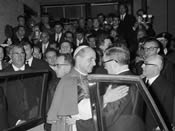The call to holiness, to union with God, which is addressed to everyone (“You must therefore be perfect, as your heavenly Father is perfect” [Mt 5:48]), is a vocation to live the new law of Charity: love of God above all creatures and love of neighbor in and for God, i.e., the unity of contemplation and action, of prayer and work, of interior life and apostolate, of building a personal relationship with God and building the kingdom of God.
All honest human work (which excludes immoral acts, precisely because those are not proper to authentic human nature) can be sanctified and sanctifying, i.e., a means for growing in union with God. Work done with human and supernatural perfection, i.e., to the best of our ability and out of love for God, becomes prayer, an acceptable offering to God, and an opportunity in which to live the human and supernatural virtues.
Indeed, from the beginning, i.e., even before the Fall of Adam and Eve, man was called to work, “to fill the earth and subdue it” (Gen 1:28), “to cultivate and care for [the garden]” (Gen 2:15), to participate in the work of creation, in continuing to perfect the material universe (perfection does not preclude its increase). Thus, work pertains to our original, authentic human nature; it is not a consequence of sin (it is the wearisome attribute we associate with work that sin introduced). Of course, even better, this vocation to cooperate in the work of creation is carried over into the “new” creation, the work of Redemption, of seeing to it that the fruits of the objective accomplishment of Christ’s Sacrifice on Calvary are applied and availed of by each individual human person as subject down the centuries. We are all called to be co-redeemers with Christ.
In the case of laypeople which we the vast majority of Christians are, building the kingdom of God—placing Christ at the summit of all reality—means doing our ordinary (secular) work well and for love of God.
The Second Vatican Council teaches:
“What specifically characterizes the laity is their secular nature. It is true that those in holy orders can at times be engaged in secular activities, and even have a secular profession. But they are by reason of their particular vocation especially and professedly ordained to the sacred ministry. Similarly, by their state in life, religious give splendid and striking testimony that the world cannot be transformed and offered to God without the spirit of the beatitudes. But the laity, by their very vocation, seek the
Politics—the work of government—is an authentic human reality that can and must be sanctified and sanctifying. It pertains to our true human nature (as distinguished from the bundle of disordered tendencies that reflect our wounded nature) as social beings. Thus: “Those who are suited or can become suited should prepare themselves for the difficult, but at the same time, the very noble art of politics, and should seek to practice this art without regard for their own interests or for material advantages.” (Gaudium et Spes, No. 75). Thus, in connection with the coming 2010 elections, the Catholic Bishops’ Conference of the Philippines found it fit to proclaim expressly: “We call upon those who are competent, persons of integrity, and committed to change, to get involved directly in principled partisan politics, and become candidates for political election, aware that the common good is above the good of vested interests” (CBCP, “Pastoral Statement on Lay Participation in Politics”, 12 July 2009).
In his most recent Encyclical Letter, Pope Benedict XVI writes:
“Development needs Christians with their arms raised towards God in prayer, Christians moved by the knowledge that truth-filled love, caritas in veritate, from which authentic development proceeds, is not produced by us, but given to us. For this reason, even in the most difficult and complex times, besides recognizing what is happening, we must above all else turn to God's love. Development requires attention to the spiritual life, a serious consideration of the experiences of trust in God, spiritual fellowship in Christ, reliance upon God's providence and mercy, love and forgiveness, self-denial, acceptance of others, justice and peace…Christians long for the entire human family to call upon God as ‘Our Father!’ In union with the only-begotten Son, may all people learn to pray to the Father and to ask him, in the words that Jesus himself taught us, for the grace to glorify him by living according to his will, to receive the daily bread that we need, to be understanding and generous towards our debtors, not to be tempted beyond our limits, and to be delivered from evil. (Encyclical Letter Caritas in Veritate, No. 79)
O.C.P.A.J.P.M.









1 comment:
Tinlo po.. Sakto po sa timpo!
Post a Comment